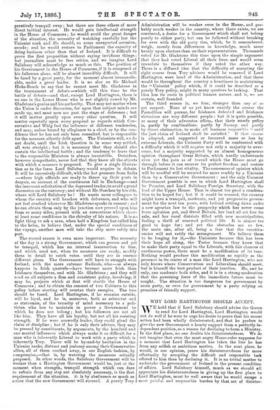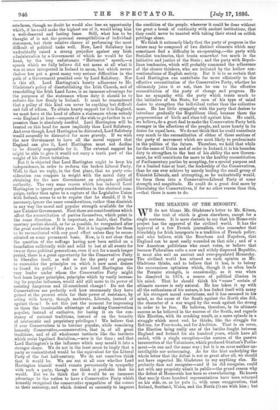WHY LORD HARTINGTON SHOULD ACCEPT.
WE hold that if Lord Salisbury should advise the Queen to send for Lord Hartington, Lord Harlington would not do well if he were to urge his desire to prove that his recent action had been wholly disinterested, and that he prefers to give the new Government a hearty support from a perfectly in- dependent position, as a reason for declining to form a Ministry. In the first place, no one doubts his disinterestedness. We do not imagine that even the most angry Home-ruler supposes for a moment that Lord Harlington has taken the line he has from any selfish or ambitious motive. In the next place, he would, in our opinion, prove his disinterestedness far more effectually by accepting the difficult and responsible task offered to him than by declining it. It is no trivial matter to undertake the government of Ireland in the present condition of affairs. Lord Salisbury himself, much as we should all appreciate his disinterestedness in giving up the first place to Lord Hartington, must be well aware that he would escape a most painful and responsible burden by that act of disinter- estedness, though no doubt he would also lose an opportunity which, if he could make the highest use of it, would bring him a well-deserved and lasting fame. Still, what has to be thought of is not the personal susceptibilities of individual statesmen, but their relative chance of performing the most difficult of political tasks well. Now, Lord Salisbury has undoubtedly raised a strong prejudice against any Irish administration by a Government of which he would be the head, by the very unfortunate " Hottentot " speech,—a speech which we fully believe did not mean at all what it was at once interpreted in Ireland to mean, but which never- theless has put a great many very serious difficulties in the path of a Government presided over by Lord Salisbury. Nor is this all. Lord Hartington's hearty adherence to Mr. Gladstone's policy of disestablishing the Irish Church, and of remodelling the Irish Land Laws, is an immense advantage for the purposes of the statesman whose duty it should be to enforce the law firmly in Ireland. It must be remembered that a policy of this kind can never be anything bat difficult and full of odium. To obtain hearty support for it in England, we must have at the head of affairs a statesman whom nobody —in England at least—suspects of the wish to go further in re- pression than is absolutely needful. Lord Hartington will be trusted on this head far more implicitly than Lord Salisbury. And even though Lord Hartington be distrusted, Lord Salisbury would assuredly be distrusted far more gravely. If we wish the new Government to have all the moral support that England can give it, Lord Hartington must not decline to be directly responsible for it. The external support he might be able to give it would not carry a tenth part of the weight of his direct initiation.
But it is objected that Lord Hartington ought to keep his independence, in order to re-form the broken Liberal Party. Well, to that we reply, in the first place, that no party con- sideration can compare in weight with the moral duty of obtaining for the new Government an adequate political authority. The very same reason which has induced Lord Hartington to ignore party considerations in the electoral cam- paign, rather than agree to a rupture of the Legislative Union with Ireland, seems to us to require that he should, if it be necessary, ignore the same considerations, rather than diminish in any way the moral and popular strength available for the new Unionist Government. Next there are considerations which affect the reconstitution of parties themselves, which point in the same direction. It is important, no doubt, that Parlia- mentary parties should, as far as possible, be reorganised after the great confusion of this year. But it is impossible for them to be reconstituted with any good effect unless they be recon- stituted on some permanent basis. Now, is it not clear that the question of the suffrage having now been settled on a foundation sufficiently wide and solid to last at all events for two or three political generations, even if not for a much longer period, there is a great opportunity for the Conservative Party to liberalise itself, as well as for the party of progress to reconsider the principles on which it now most desires to found its policy ? And is not Lord Hartington the very leader under whom the Conservative Party might best learn larger principles, principles which by vastly increas- ing its popular influence, would add still more to its power of resisting dangerous and ill-considered change ? Do not the Conservatives see perfectly well how enormously they have gained at the present crisis for their power of resistance, by acting with hearty, though moderate, Liberals, instead of against them ? Is not this just the moment for impressing on them the incalcuable advantage of making Conservatism popular, instead of exclusive, for basing it on the con- stancy of national traditions, instead of on the tenacity of aristocratic and proprietary privileges ? We believe that if ever Conservatism is to become popular, while remaining honestly Conservative,—conservative, that is, of all great traditions, and of all wholesome instincts like the instincts , which resist legalised Socialism,—now is the time ; and that Lord Hartington's is the influence which may mould it into a stronger shape. We do not in the least mean to imply that a party so reconstituted would be the equivalent for the Liberal Party of the last half-century. We do not ourselves think that it would be. We are not at all sure whether Lord Hartington himself would remain permanently in sympathy with such a party, though we think it probable that he would. But we do think that it would be an immense advantage to the nation to have a Conservative Party which honestly recognised the conservative sympathies of the masses 33 their, mainstay, and which desired so earnestly to improve
the condition of the people, wherever it could be done without too great a break of continuity with ancient institutions, that they could never be taunted with taking their stand on selfish privilege alone.
We think it extremely likely that the party of progress in the future may be composed of two distinct elements which may sometimes find a difficulty in co-operating,—the party with Socialist tendencies, that trusts somewhat too much in the initiative and justice of the State ; and the party with Repub- lican tendencies, which will probably command the adherence of the clearer thinkers, who are irritated by the hollow con- ventionalisms of English society. But it is to us certain that Lord Hartington can contribute far more efficiently to the effective reconstitution of the Conservative Party, whether he ultimately joins it or not, than he can to the effective reconstitution of the party of change and progress. He has no sympathy with the party which trusts much to the initiative of the State, for men of his type of mind desire to strengthen the individual rather than the collective mass. He has little sympathy with the party that desires to introduce gradually the Republican ideal, because there the prepossessions of birth and class tell against him. He could, we believe, do a great deal to make the Conservative Party both stronger in the affections of the people, and more hearty in its desire for equal laws. We do not think that he could contribute very much to the reconstitution of either of those sections of the party of movement which are most likely to predominate in the politics of the future. Therefore, we hold that while for the cause of Union and of order in Ireland, it is his bounden duty to strengthen to the best of his ability the new Govern- ment, he will contribute far more to the healthy reconstitution of Parliamentary parties by accepting, for a special purpose and for a limited time at least, the leadership of the Conservatives, than he can ever achieve by merely leading the small group of Unionist Liberals, and attempting, as he undoubtedly would, to form them into a Conservative-Liberal Party of some strength and magnitude. He could do a great deal more by liberalising the Conservatives, if for no other reason than this, —that there is more to do.



































 Previous page
Previous page